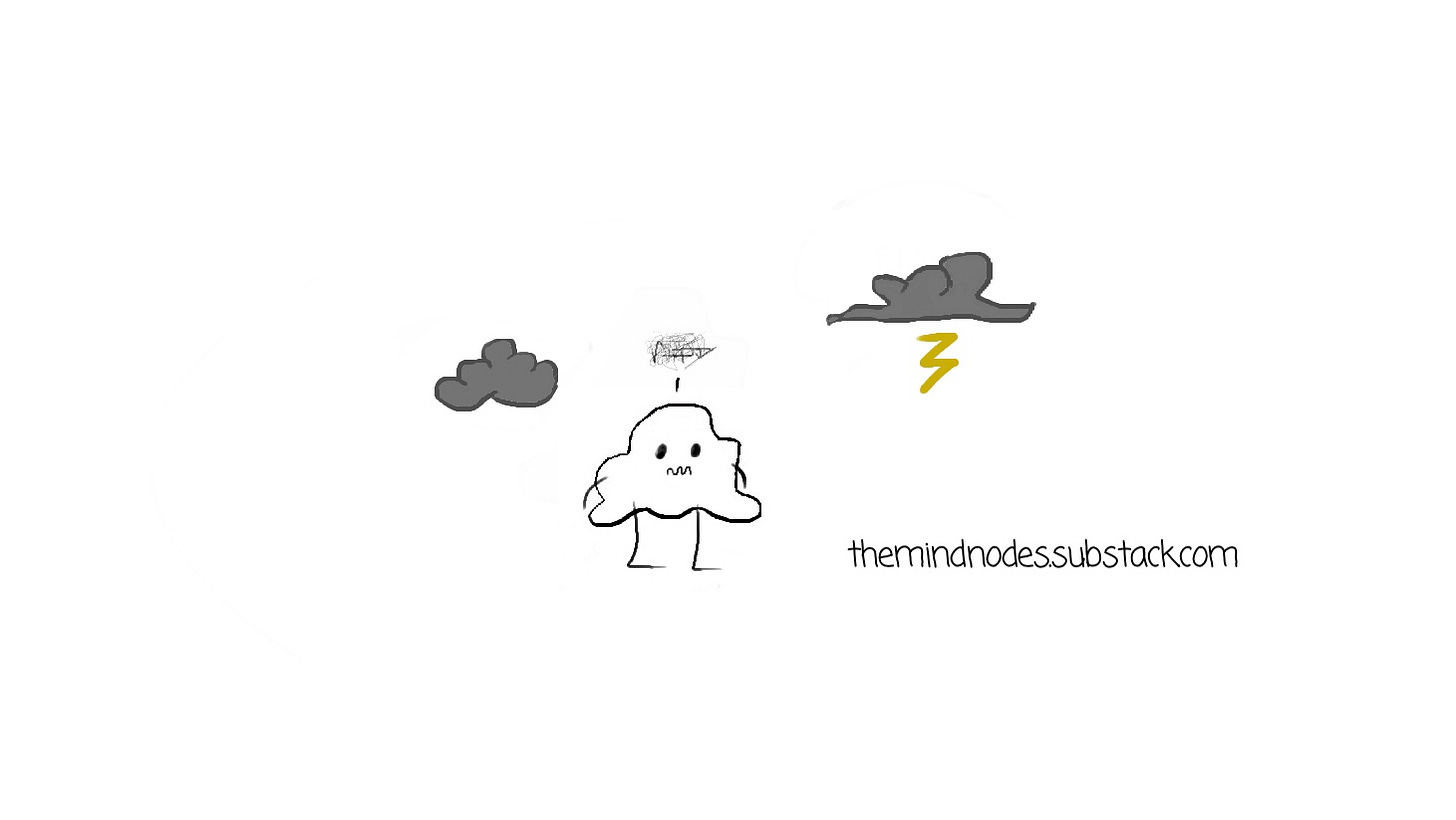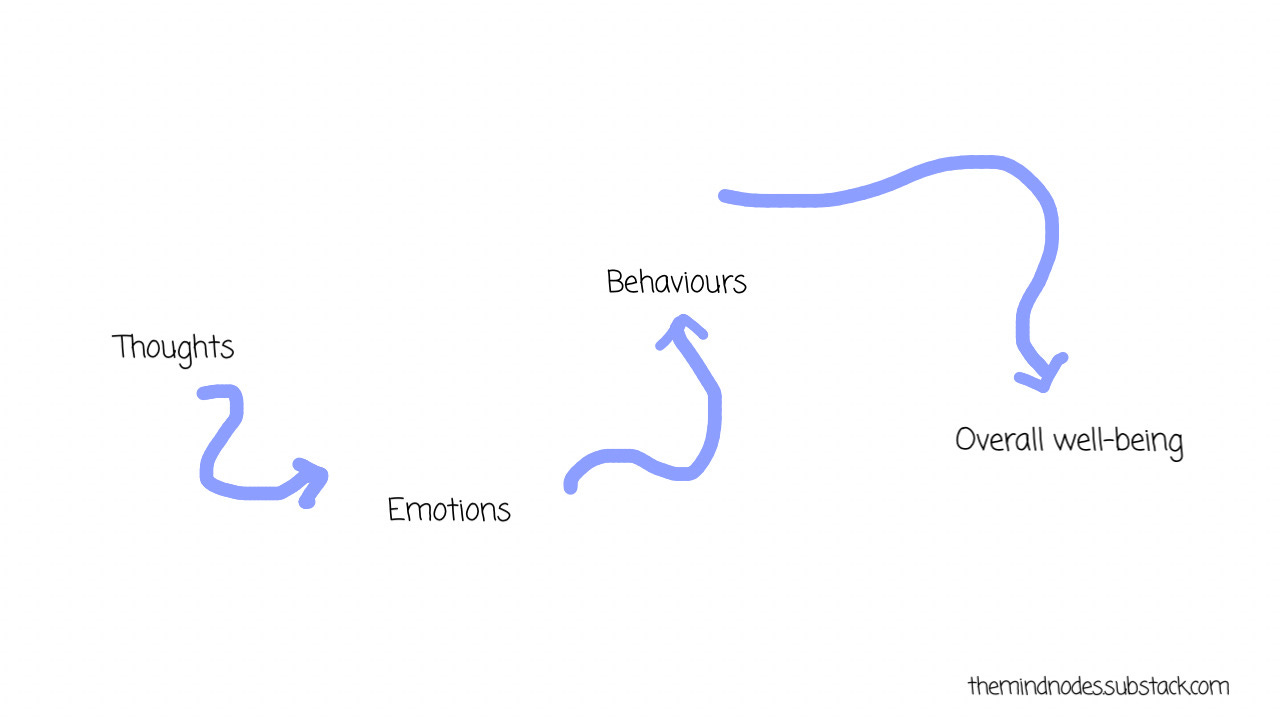Why we overthink
a real day in the life of an overthinker.
07:55 My alarm goes off. But I’m already awake. And I promise, I wasn’t scrolling through my phone 👀
08:15 Think, in the shower: “What if I leave and regret it? What if I stay and regret it?”
08:17 Also: “Why did Apple make “copy text from image” exclusive to some iPhones when you can literally just do it on Google Photos? Ugh.”
08:55 Head to work.
10:30 Catch a quick breakfast.
10:37 Work.
13:20 Have a mini-existential breakdown and ask myself “Am I even doing enough, or maybe even too much?”
13:30 Go back to work. Three patients have arrived, at the same time.
16:30 Think: “What if I don’t have what it takes, whatever “it” is anyway? What if my plans don’t work out?”
17:05 Head home, enjoying the lone drive where I can just…be.
18:30 Think: “I wonder what life would have been like if I’d gone to another school, town or country.”
20:00 Make myself a warm cup of tea. I’m slightly addicted at this point.
20:35 Agonise over posting a photo online.
21:05 Binge-watch Merlin episodes on Netflix to distract myself.
21:12 Delete proposed post.
21:13 More Merlin.
23:15 Think: “Maybe that post wasn’t so bad.”
23:55 Write a late-night journal entry:
Do you ever think…what if I’m not who I think I am? What if I’m not actually smart enough or kind enough or hardworking enough or deserving enough?
They say to have dreams bigger than you, but what happens when they become a hindrance rather than an inspiration?
00:05 Finally fall asleep.
An abridged version.
Described as the tendency to monitor, analyse and control every single thought, overthinking is actually more common than thought (hehe).
While it’s clearly beneficial to think things through, this can easily become toxic when we replay the same problem over and over again, unproductively. This can then lead to regrets, self-blaming and an inability to move on/“analysis paralysis”.
But even though it seems like “who cares?”…
Thoughts matter.
It’s the basis for the treatment modality — Cognitive Behavioural Therapy — used in managing some mental illnesses, such as clinical depression and anxiety disorder.
There’s actually a (bi-)directional relationship between our thoughts and emotions. These go on to affect our behaviours, and life as a whole.
And while there’s a philosophical angle to what thoughts even are, let’s look at psychology today.
In case you missed last week’s issue on Why Doing Good Feels Good.
I mean, while it’s perfectly normal to think through things, overthinking plays into the human tendency to overdo things. This usually never ends well.
Why do some of us tend to overthink, while it seems like other people underthink (wait, is that a thing?)
Why we overthink
“When overthinking, you create a million scenarios in your mind, starting from a simple thought, and in this tornado, it's easy to get plagued with negative emotions. As most overthinkers, you're worried about the future and forget to live the present.” — Source
Overthinking is a response to our primitive instinct to stay alert and safe.
But this is closely related to another factor — past trauma. This is because it rewires the brain to become on edge.
“Overthinking can happen to anyone, but those who have experienced trauma can be especially vulnerable.”
But what about personality traits? Is it associated with certain people, regardless of past events? Dr Sherman, a psychologist, seems to think so.
"When people are perfectionists they can ruminate about mistakes they made or may make.” — Dr. Sherman
Life in itself can be difficult.
Why do we make it harder by thinking about things that probably don’t matter?
I personally think it’s because overthinking gives a false sense of control, and can be its own form of procrastination. It can be addictive, even when we actually do want it to stop.
At least this has been my experience, especially over the past few days. I spoke more about it in this personal post up on Patreon.
Make it stop…?
I’ve come across different hacks that are supposed to help — meditation, talking to a friend, trying to think positively instead. All of which work.
But in my experience, what has helped me is to disengage. And I mean that in physical terms.
Spending time outdoors is a huge one.
There’s something about not being too inside-my-own-head by not being literally inside a building as well. It’s less claustrophobic.
But only after writing a list of these bothersome thoughts, especially the more recurrent ones, can I disengage to some degree.
What are these thoughts?
Which ones can I do something about?
Which need to be left alone as nothing really can be done?
Maybe there’s some comfort to be found in the fact that no matter how much we think through a thing, there can still be loopholes we’ll miss.
And I still don’t have a full grasp on everything. But it’s definitely a start.
Like trying to not over-think if this letter perfectly articulated my thoughts.
🔌 Recommendation of the week!
This touching animated short film on depression, stepping into the light, growing and finding community.
It had me smiling throughout and of course, inspired me to jot a couple of things in my journal.







Pretty pretty as usual doc!
I've found it easier to write it down in my journal as well to be the first step in letting go when overthinking.
The most crucial step though is organizing the thoughts into two schools as neutral as I can. What can I do about it school and what is beyond my control school.
Then act on what I can do about it. That sorts of brings back that element or sense of control.
Thank you for another beauty doc!